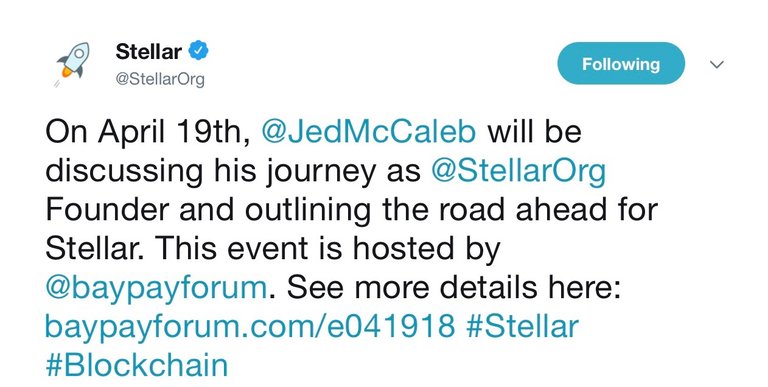
If you're even the slightest bit involved in crypto, chances are you've heard of Stellar. They have some of the quickest, and cheapest, transactions on the market today. You can send the equivalent of thousands of dollars across the world in a matter of seconds...and for less than $0.01. In terms of speed and tech, Stellar is far outpacing many of its competitors...but founder Jed McCaleb is not satisfied. He's been working to make sure Stellar's light years ahead of the competition when it comes to future scalability. McCaleb surprised the crypto community when he announced Stellar would launch its own Lightening Network by the end of 2018. This caused many to ask, what is Stellar planning to so with that kind of scalability?
An article written by The Independent Republic outlines Stellar's reason for implementing Lightening on top of what's already a lightning fast currency.

Stellar Lumens (XLM)
Lighting, the network already working on Bitcoin and Litecoin’s network, brings great solutions to scaling problems. The attention around it, and the interest of other crypto-platforms to use it, is obviously well justified. The payment of microtransactions using Bitcoin, has only been possible since the Lighting network was inserted in their platform. Stellar (XLM), on the 19th of March, reaffirmed on their Roadmap an interest to incorporate the Lightning network on their platform in 2018.
Quoted from Stellar's website: “Scalability has been at the center of some of the most bitter disagreements in blockchain. We’ve tried to approach the problem with an open mind. To the extent and idea improves what our users care about- speed, throughput, privacy- we will explore it, and since a typical Lightning payment:
-can be confirmed instantly
-has negligible fees
– doesn’t have to become public
The protocol has always interested us. As we said in our 2018 Roadmap it’s now clear that Lightning is the right way forward for Stellar.”

Lightning Network- How does it work?
Lightning is a solution for the scaling problems in distributed payment networks. Originally it was used for Bitcoin and later implemented on Litecoin. This network allows users to make off-chain payment channels through routers and hubs utilizing smart contracts, which means there's less strain on the main network. Lightning also has the potential to support cross-protocol payments. These are payment where one sends Litecoin on Litecoin’s network (for example) and the recipient receives lumens on Stellar’s network, without having a middle man or any kind of party in between. This concept is very simple to process, but powerful at the same time. And, as I said before, these are off-chain transactions. This means they're much cheaper and faster, with the advantage of being similar to on-chain transactions so they have the safety background as well.
Smart contracts, or payment channels, are made in order to close as soon as the transactions are made. They then turn into the public ledger again. No matter what the processes in-channel are, the world will only be capable of seeing the final transaction. Of course, all the crypto-platform channels have their nuances and differences when compared to others, but to implement Lightning Network there are 4 basic requirements:
First, no transaction is submitted to the network, except when the parties disengage and the channel goes off.
Second, there is no loss of funds caused by cheating parties.
Third, there's no vulnerability to third-party interference as a channel is a connection between a sender and a receiver, that is it.
Finally, there are no channel-side speed bottlenecks.

Stellar Lumens (XLM) and Lightning Network
This cryptocurrency proves to support a more flexible generalization of payment channels, called state channels. This means that any operation executed on the Stellar network can be executed within a payment channel. Thanks to the Lightning network, a rate of thousands of transactions per second will be possible. Let us not forget that users also receive the benefit of privacy, since the only amount visible on the public ledger will be the final transaction.
The cherry on top will be permission of low-fee and instantaneous atomic swaps between a wide variety of alt-coins...something that will be essential for the success of Stellar’s Decentralized Exchange. Throughout the evolution of Stellar and the appearance of the Lighting network, this was a platform that always showed big interest around the possibility of making this integration. Of course, Stellar already explored the possibility of Lightning back in 2015, but sometimes the best option is to hold a decision until the time is right. In this case, it seems that 2018 is the right time to do it. Stellar's developing team has been adding the necessary improvements to make Lightning suit Stellar’s network perfectly.
Bellow you will find two different links, where it is possible to find a more technical discussion around this implementation, in a very transparent thread with some interesting points and code explanations:
https://github.com/stellar/stellar-protocol/issues/53
https://www.stellar.org/blog/lightning-on-stellar-roadmap/
What to expect in the future
Cryptocurrencies are becoming more and more famous and the number of companies and partnerships in their environment grows every day. To become a trustworthy platform, the capability to handle sensitive information with security and efficiency is mandatory. Scalability solutions are only one of the foundations needed to take a platform to the upper level.
Not only will Stellar (XLM) implement the Lightning network this year, but they're also on the move to have their own Decentralized Exchange while focusing on developing their own ecosystem. This exchange will be called SDEX (Stellar’s Decentralized Exchange). Stellar’s network must be proud of the advances it's making. These are notorious steps towards the creation of a platform where every digital asset will be possible to trade in one place.
Link to full article found here:
https://theindependentrepublic.com/2018/03/26/stellar-xlm-to-implement-lightning-network-by-the-end-of-2018/
What's Next For Stellar?
The Stellar Foundation recently announced (via twitter ) an event where founder Jed McCaleb would be outlining plans for Stellar's future.

Link to tweet found here:
The event will be hosted by BayPay on April 19, 2018 from 5:30-8:30pm PST. It's taking place at the following location:
735 Battery Street, First Floor
San Francisco, CA 94111
United States
More information can be found here: https://www.baypayforum.com/e041918

I hope this has been helpful. If you enjoyed this article, please let me know by following me and clicking the up-vote tab below. As always, if you resteem my post, leave me a comment and I’ll return the favor by resteeming one of yours. If you didn’t enjoy this article, let me know how I can improve to earn your vote in the future.
Disclaimer: I am NOT a financial advisor and this is NOT financial advice. Please always do your own research and invest responsibly.
#crypto #life #steemit #steem #blog #news #bitcoin #cryptocurrency #investing #eos #finance #btc #ethereum #litecoin #ripple #stellar #nano #icon #cardano #xlm #xrp #eth #bch #vechain #ven #digibyte #dgb #binance #ripple #ltc #tron #trx #bnb
Nice blog...hard work clearly visible...cheers 👍
Thanks Ahlawatkavita.
Thanks. Very good article and lots of informations about stellar.
Bitbob hopes :)
As do I my friend
Nicely described by you about coin
Thanks Rayhan02
Coins mentioned in post:
Stellar is currently a sleeping giant. I strongly believe this coin will turn out to be one of the best investments of 2018.